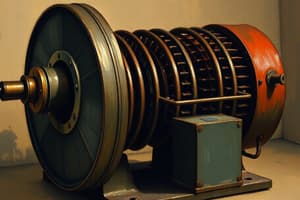Podcast
Questions and Answers
Endüksiyon motorlarının çalışması hangi prensibe dayanır?
Endüksiyon motorlarının çalışması hangi prensibe dayanır?
- Termal enerji
- Elektromanyetik endüksiyon (correct)
- Manyetik alan
- Elektrik akımı
Motor kontrol yöntemlerinden birisi nedir?
Motor kontrol yöntemlerinden birisi nedir?
- Frekans kontrolü (correct)
- Voltaj kontrolü
- Enerji depolama kontrolü
- Güç faktörü kontrolü
Elektrikli sürücü sistemlerinde, güç kaynağı hangi parçadır?
Elektrikli sürücü sistemlerinde, güç kaynağı hangi parçadır?
- Güç kaynağı (correct)
- Motor
- Kontrol ünitesi
- Power converter
Senkron motorunun bir başka adı nedir?
Senkron motorunun bir başka adı nedir?
AC motorunun bir avantajı nedir?
AC motorunun bir avantajı nedir?
DC motorunun bir avantajı nedir?
DC motorunun bir avantajı nedir?
Elektrik motorlarının verimliliğini artırmak için hangi yöntemler kullanılır?
Elektrik motorlarının verimliliğini artırmak için hangi yöntemler kullanılır?
Elektrik motorlarının bakımında hangi yöntem kullanılır?
Elektrik motorlarının bakımında hangi yöntem kullanılır?
Elektrik motorlarının bakımının önemi nedir?
Elektrik motorlarının bakımının önemi nedir?
Endüksiyon motorlarının rotor hızı nedir?
Endüksiyon motorlarının rotor hızı nedir?
Study Notes
Electrical Machines
Induction Motors
- Also known as asynchronous motors
- Most commonly used type of motor in industrial applications
- Work on the principle of electromagnetic induction
- Consist of a stator and a rotor
- Rotor rotates at a speed slightly less than the synchronous speed
- Slip ring and squirrel cage are two common types of induction motors
Motor Control
- Involves controlling the speed, torque, and direction of a motor
- Methods:
- Voltage control: varying the voltage supplied to the motor
- Frequency control: varying the frequency of the AC supply
- Pulse Width Modulation (PWM): rapidly switching the voltage on and off
- Control systems:
- Open-loop control: no feedback from the motor
- Closed-loop control: feedback from the motor is used to adjust the control signal
Electrical Drives
- A system that uses electrical energy to power a motor
- Consists of:
- Power supply
- Power converter
- Motor
- Types:
- AC drives
- DC drives
- Servo drives
- Applications:
- Industrial automation
- HVAC systems
- Transportation systems
Synchronous Motor (Senkron Motor)
- Also known as reluctance motor
- Rotor rotates at the same speed as the rotating magnetic field
- Advantages:
- High efficiency
- High power factor
- Low vibration
- Applications:
- Power generation
- Industrial applications
- Aerospace industry
AC Motor
- Uses alternating current (AC) to generate torque
- Types:
- Induction motor
- Synchronous motor
- Wound rotor motor
- Hysteresis motor
- Advantages:
- Simple and rugged construction
- Low maintenance
- High efficiency
DC Motor
- Uses direct current (DC) to generate torque
- Types:
- Permanent magnet motor
- Wound field motor
- Series motor
- Shunt motor
- Advantages:
- High torque at low speed
- Easy speed control
- Simple and rugged construction
Efficiency and Maintenance of Electrical Motors
- Efficiency:
- Depends on the type of motor and its construction
- Can be improved by using high-efficiency motors and reducing energy losses
- Maintenance:
- Regular cleaning and lubrication
- Monitoring temperature and vibration
- Scheduled inspections and repairs
- Importance of maintenance:
- Reduces downtime and increases productivity
- Extends the lifespan of the motor
- Improves efficiency and reduces energy costs
Elektrik Makineleri
Endüksiyon Motorları
- Asenkron motorlar olarak da bilinir
- Sanayi uygulamalarında en yaygın kullanılan motor tipi
- Elektromanyetik indüksiyon prensibine dayanır
- Stator ve rotorPARTSden oluşur
- Rotor, senkronik hızın biraz altında döner
- Slip ring ve squirrel cage, endüksiyon motorlarının iki ortak tipidir
Motor Kontrolü
- Motorun hız, tork ve yönünü kontrol eder
- Yöntemler:
- Voltaj kontrolü: motorüne verilen voltajı değiştirme
- Frekans kontrolü: AC gücünün frekansını değiştirme
- PWM (Pulse Width Modulation): voltajı hızla açıp kapatma
- Kontrol sistemleri:
- Açık döngü kontrolü: motor GERİ bildirim yok
- Kapalı döngü kontrolü: motor GERİ bildirimini kullanarak kontrol sinyalini ayarlar
Elektirik Sürücüleri
- Elektrik enerjisini kullanarak motoru çalıştıran sistem
- Bileşenler:
- Güç kaynağı
- Güç dönüştürücü
- Motor
- Türler:
- AC sürücüleri
- DC sürücüleri
- Servo sürücüleri
- Uygulamalar:
- Sanayi otomasyonu
- HVAC sistemleri
- Ulaşım sistemleri
Senkron Motor (Senkron Motor)
- İlişkili motor olarak da bilinir
- Rotor, manyetik alanda dönerken aynı hızda döner
- Avantajları:
- Yüksek verim
- Yüksek güç faktörü
- Düşük titreşim
- Uygulamalar:
- Güç üretimi
- Sanayi uygulamaları
- Uzay endüstrisi
AC Motor
- Alternatif akım (AC) kullanarak tork üretir
- Türler:
- Endüksiyon motoru
- Senkron motoru
- Wound rotor motoru
- Histerezis motoru
- Avantajları:
- Basit ve dayanıklı inşaat
- Düşük bakım gereksinimi
- Yüksek verim
DC Motor
- Doğrudan akım (DC) kullanarak tork üretir
- Türler:
- Kalıcı mıknatıs motoru
- Wound field motoru
- Seri motoru
- Shunt motoru
- Avantajları:
- Düşük hızda yüksek tork
- Kolay hız kontrolü
- Basit ve dayanıklı inşaat
Verimlilik ve Bakım
- Verimlilik:
- Motor tipine ve inşaatına göre değişir
- Yüksek verimli motorların kullanılması ve enerji kayıplarının azaltılmasıyla iyileştirilir
- Bakım:
- Düzenli temizlik ve yağlama
- Sıcaklık ve titreşim izleme
- Düzgün olarak planlanmış inspection ve onarım
- Bakımın önemi:
- Downtime'ı azaltır ve üretkenliği artırır
- Motor ömrünü uzatır
- Verimliliği artırır ve enerji maliyetlerini azaltır
Studying That Suits You
Use AI to generate personalized quizzes and flashcards to suit your learning preferences.
Description
Bu quiz, endüksiyon motorlarının temel prensiplerine, çeşitlerine ve kontrol yöntemlerine odaklanmaktadır. Endüksiyon motorları, sınai uygulamalarda en yaygın kullanılan motor türüdür.




